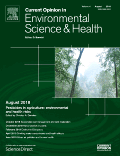
Current Opinion in Environmental Science & Health
Scope & Guideline
Connecting Science and Public Health for Tomorrow
Introduction
Aims and Scopes
- Environmental Health Impacts:
The journal covers research on how environmental factors, such as pollutants and climate change, affect human health and ecosystems, providing insights into disease mechanisms and public health implications. - Pollutant Detection and Remediation:
A significant focus is on innovative methods for detecting and remediating environmental contaminants, including emerging pollutants and nanomaterials, which are pivotal for sustainable environmental management. - Sustainability and Ecosystem Management:
Articles often explore sustainable practices and technologies, including nature-based solutions and circular economy principles, aimed at restoring and preserving ecosystems. - Interdisciplinary Approaches:
The journal encourages interdisciplinary research that combines insights from environmental science, health sciences, and technology, fostering comprehensive solutions to complex environmental problems. - Policy and Regulatory Frameworks:
Research often includes discussions on policy implications and regulatory measures necessary for managing environmental risks and promoting public health.
Trending and Emerging
- Emerging Contaminants:
There is a growing focus on emerging pollutants such as microplastics, pharmaceuticals, and personal care products, reflecting an increased awareness of their environmental and health impacts. - Nature-Based Solutions:
Research on nature-based solutions for ecosystem restoration and pollution mitigation is trending, highlighting their potential for sustainable management and resilience against climate change. - Artificial Intelligence and Machine Learning:
The application of AI and machine learning for environmental monitoring and risk assessment is gaining traction, showcasing innovative approaches to data analysis and decision-making. - Public Health Implications of Climate Change:
The intersection of climate change and public health is increasingly prominent, with studies exploring how environmental changes affect health outcomes, particularly in vulnerable populations. - Circular Economy Practices:
Emerging themes around circular economy practices and waste valorization are becoming more common, emphasizing sustainability and resource efficiency in environmental management.
Declining or Waning
- Traditional Chemical Pollutants:
Research on conventional pollutants such as heavy metals has decreased as newer contaminants, particularly microplastics and pharmaceuticals, gain attention. - Single-Factor Health Assessments:
There is a shift away from studies focusing solely on individual pollutants towards more complex assessments that consider multiple stressors and their cumulative effects on health. - Static Environmental Monitoring:
The emphasis on static monitoring methods for environmental contaminants is waning in favor of dynamic, real-time monitoring technologies that provide more relevant data for risk assessment. - Localized Case Studies:
While local case studies remain important, there is a noticeable trend towards broader, global analyses that address transboundary environmental issues and their health implications. - Traditional Agricultural Practices:
Research on conventional agricultural practices is declining as the focus shifts towards sustainable and innovative agricultural methods that reduce environmental impact.
Similar Journals
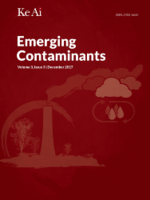
Emerging Contaminants
Advancing knowledge on novel pollutants.Emerging Contaminants is a leading international journal dedicated to the exploration and analysis of novel pollutants, their effects, and the methodologies for their detection and remediation. Published by KEAI PUBLISHING LTD in China, this Open Access journal has been at the forefront of scientific discourse since its inception in 2015, allowing unrestricted access to cutting-edge research. With an impressive categorization in the top Q1 quartile across diverse fields, including Health, Toxicology and Mutagenesis, and Public Health, it ranks remarkably high—41st out of 665 in Public Health and 10th out of 133 in Toxicology according to Scopus metrics, demonstrating its vital role in advancing our understanding of environmental health risks. By bridging the gap between academia and practical applications, Emerging Contaminants not only enriches the scientific community but also serves as an essential resource for policymakers and industry leaders seeking effective solutions to environmental challenges. Researchers, professionals, and students alike are encouraged to engage with the journal’s comprehensive studies and findings, contributing to a sustainable future.

Reviews of Environmental Contamination and Toxicology
Advancing knowledge in environmental health and toxicology.Reviews of Environmental Contamination and Toxicology is a leading journal published by SPRINGER, dedicated to advancing the understanding of environmental science, toxicology, and public health. Since its inception in 1987, this esteemed journal has established itself as an invaluable resource for researchers and practitioners alike, showcasing a wealth of peer-reviewed articles that delve into the complexities of environmental contaminants and their effects on human health and ecosystems. With an impressive impact factor and consistently ranking in the Q1 category across multiple fields including Health, Toxicology and Mutagenesis, as well as Public Health, this journal commands attention, boasting Scopus rankings that place it among the top-tier publications globally. Researchers will find that the journal provides not only in-depth reviews but also practical implications for policy and practice regarding environmental issues. Located in the heart of New York, Reviews of Environmental Contamination and Toxicology is poised to remain at the forefront of this critical field through 2024 and beyond, making it an essential addition to the library of any environmental health scholar or practitioner.
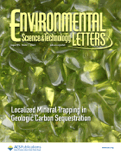
Environmental Science & Technology Letters
Transforming research into actionable environmental solutions.Environmental Science & Technology Letters, published by the American Chemical Society, stands as a premier journal in the realm of environmental science and technology, focusing on pivotal studies that address pressing environmental challenges. With an impressive Q1 ranking in multiple categories including Ecology, Environmental Chemistry, and Pollution, this journal maintains a position of excellence within its field, achieving Scopus ranks that place it in the top percentile of Environmental Science disciplines. Although not open access, Environmental Science & Technology Letters offers vital insights and cutting-edge research that contribute significantly to the understanding and management of environmental issues. The journal’s objectives include disseminating ground-breaking findings and promoting discussions that lead to sustainable solutions. With convergence from 2013 to 2024, it continues to serve as an essential resource for researchers, professionals, and students committed to advancing knowledge and innovation in environmental science.

Environmental Epidemiology
Illuminating the path to effective public health interventions through rigorous research.Environmental Epidemiology is a leading open-access journal published by Lippincott Williams & Wilkins, dedicated to advancing the field of environmental and public health research. Since its establishment in 2017, this journal has emerged as a vital platform for scholars and practitioners interested in the intricate relationships between environmental factors and health outcomes. With an impressive impact factor reflecting its rigorous peer-review process and a robust Scopus ranking—notably holding Q1 positions in categories such as Health, Toxicology and Mutagenesis, and Public Health—this journal is essential for those seeking to explore the latest findings and methodological advances in environmental epidemiology. Open access since 2018, it ensures wide dissemination of research findings, promoting accessibility and engagement among a global audience of researchers, policymakers, and students. As it continues to converge through 2024, Environmental Epidemiology remains committed to publishing high-quality articles that address pressing environmental health challenges, fostering interdisciplinary collaboration and knowledge sharing that is crucial for developing effective public health interventions.

Journal of Environmental Health Science and Engineering
Connecting academia and practice in environmental health science.Journal of Environmental Health Science and Engineering, published by Springer, stands at the forefront of scholarly research in environmental health and engineering. With an impressive E-ISSN of 2052-336X and a significant impact factor reflected in its Q2 quartile rankings across various essential categories—including Applied Microbiology, Environmental Engineering, and Public Health—the journal serves as a vital platform for disseminating high-quality research from 2012 to 2024. Its rankings in fields such as Environmental Science and Waste Management position it as a distinguished resource for professionals and academics aiming to advance their understanding of contemporary environmental challenges. As an open-access journal based in Switzerland, it champions accessibility and collaboration, allowing researchers to share insights that influence policy and practical applications in environmental health. The journal's commitment to fostering innovative research makes it indispensable for those dedicated to enhancing the intersection of environmental science and public health.

Environmental Engineering and Management Journal
Exploring innovative pathways in environmental management.Welcome to the Environmental Engineering and Management Journal, a pivotal platform for disseminating knowledge and innovative research in the fields of Environmental Engineering, Management, Monitoring, Policy, and Law. Published by GH Asachi Technical University of Iasi in Romania, this journal has been committed to fostering discussions and advancements in environmental solutions since its inception in 1988, with continuous publication from 2002 to 2024. While classified in the Q4 category across various environmental disciplines in 2023, it remains an important resource for scholars and practitioners navigating the complexities of pollution and environmental management. With an ISSN of 1582-9596 and an E-ISSN of 1843-3707, this journal encourages submissions that address pressing ecological challenges and provide actionable insights. Although currently not open access, it seeks to expand its reach and relevance within the global academic community. Join us as we explore critical environmental issues and contribute to sustainable practices worldwide.
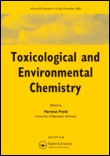
TOXICOLOGICAL AND ENVIRONMENTAL CHEMISTRY
Exploring the impacts of pollutants on our environment and well-being.TOXICOLOGICAL AND ENVIRONMENTAL CHEMISTRY is a pivotal journal published by Taylor & Francis Ltd, addressing critical intersections between environmental chemistry and toxicology since its inception in 1979. With its ISSN 0277-2248 and E-ISSN 1029-0486, the journal serves as a platform for rigorous research and innovative methodologies in pollution control, health implications of environmental chemicals, and the broader spectrum of toxicological studies. Although it currently does not offer open access, the journal's impact in the field is underscored by its Category Quartiles rankings in 2023, placing it in Q3 across Environmental Chemistry, Health, Toxicology and Mutagenesis, and Pollution categories. Furthermore, its Scopus rankings reveal its significant role within the scientific community, specifically in areas such as Environmental Science and Toxicology. The journal aspires to foster multidisciplinary dialogue and advance knowledge that contributes to environmental sustainability and public health, making it an essential resource for researchers, professionals, and students dedicated to these fields.

Atmospheric Environment-X
Unlocking the secrets of our atmosphere for a better tomorrow.Atmospheric Environment-X, published by Elsevier Science Ltd, is a premier, open-access journal dedicated to advancing our understanding of atmospheric science and environmental disciplines. Since its inception in 2019, the journal has established itself as a critical platform for disseminating high-quality research, evident by its impressive Scopus rankings—39th out of 233 in General Environmental Science and 27th out of 148 in Atmospheric Science, placing it within the top quartiles of its fields. Operating from the United Kingdom, Atmospheric Environment-X aims to bridge the gap between fundamental research and practical applications, addressing pressing issues related to air quality, climate change, and environmental sustainability. With its commitment to open access, the journal encourages broad accessibility of knowledge, ensuring that cutting-edge research reaches a global audience of researchers, professionals, and students eager to contribute to the field. Join us as we explore the complexities of our atmosphere and its critical interactions with the environment through groundbreaking studies published up to 2024.
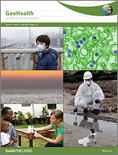
GeoHealth
Empowering Public Health Through Environmental InsightsGeoHealth is a premier open-access journal published by the American Geophysical Union, focusing on the intersection of environmental and health sciences. Launched in 2017, the journal has rapidly established itself with an impressive Q1 ranking in multiple categories, including Epidemiology, Global and Planetary Change, and Public Health, reflecting its commitment to high-quality research and impactful scholarship. Covering a broad spectrum of topics, GeoHealth provides a platform for scientific discussions on key issues such as health, environmental sustainability, pollution, and governance. With an accessible model, researchers and practitioners can freely share and access vital findings, significantly contributing to advancements in public health and environmental management. Exploring critical dimensions of health in relation to environmental changes, GeoHealth is essential reading for those seeking to understand and address contemporary challenges in health and environmental sectors.
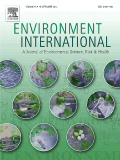
ENVIRONMENT INTERNATIONAL
Connecting Scholars to Tackle Global Environmental IssuesENVIRONMENT INTERNATIONAL is a premier journal dedicated to advancing the field of environmental science. Published by PERGAMON-ELSEVIER SCIENCE LTD, it boasts an impressive impact factor and holds a prestigious Q1 classification in the Environmental Science category, reflecting its influence and reputation within academia. Since transitioning to Open Access in 2019, the journal has increased its accessibility, allowing a wider audience—from researchers to industry professionals—to engage with cutting-edge studies that address crucial environmental challenges. With a Scopus rank of #3 out of 233 in General Environmental Science and a commendable 98th percentile, ENVIRONMENT INTERNATIONAL is committed to publishing high-quality research that informs policy and practice. Covering a broad spectrum of topics from pollution and climate change to sustainable development, this journal serves as a vital resource for those dedicated to making a positive impact on our planet. For submissions, inquiries, or to explore its extensive archives dating from 1976 to 2024, please visit their site at the Kidlington, Oxford headquarters.